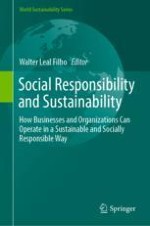2019 | OriginalPaper | Chapter
An Indigenous ‘Right Way’ Environmental, Social and Cultural Core-Benefits Verification Standard
Authors : Lisa McMurray, Rowan Foley, Carl O’Sullivan
Published in: Social Responsibility and Sustainability
Publisher: Springer International Publishing
Activate our intelligent search to find suitable subject content or patents.
Select sections of text to find matching patents with Artificial Intelligence. powered by
Select sections of text to find additional relevant content using AI-assisted search. powered by
